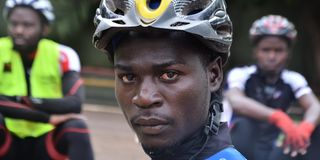High bicycle prices limiting entry into pro cycling

Paul Serugo, a water engineer and road racer with Busega Cycling Club
What you need to know:
- Paul Serugo, a water engineer and road racer with Busega Cycling Club said the high costs of acquiring desired bicycles prevents many prospects from realising their dreams
Even as cycling gains international fame, the case is different from Uganda as the sport chills in the shadow of neglect. Yet according to enthusiasts, that is negligible. To them, the biggest detriment is the high cost of bicycles.
Paul Serugo, a water engineer and road racer with Busega Cycling Club said the high costs of acquiring desired bicycles prevents many prospects from realising their dreams.
Serugo is among the 30 cyclists that set off from Kampala at the Independence Monument this week to embark on a six-day 900km trip to Queen Elizabeth National Park in the first edition of ‘Bike Packing for Conservation’.
According to Innocent Taima, the event organiser, the group, which mostly constitutes amateur riders, will plant trees along their route.
The Bike Packing for Conservation trip will be broken into six sections. The riders slept in Lukaya on the first day before embarking on 98km to Lyantonde before proceeding to Mbarara the following day. On the fourth day, the riders had a stopover in Rubirizi before hitting the road to Mweya.
They will conclude with a ride in Queen Elizabeth National Park before driving to Kampala on today through Fort Portal.
But for the professionals, there is more room for growth of the sport. Serugo started riding about two years ago during the Covid-19 induced lockdown and has since become a road racer.
“When I started it was for fun. Right now I find it more fulfilling,” Serugo says.
“But to become a professional rider is pretty hard. The bike itself is very expensive while it needs one to start earlier,” Serugo, who bought a mid-level bike at Shs4.5m, says.
To participate in UCI-sanctioned, competitors must abide by the 6.8kg minimum weight of the bike. Those versatile bikes are more aerodynamic, stiffer, better in shifting and with such accessories as a power metre, are even more expensive.
Sam Muwonge, the president of the Uganda Cycling Association (UCA) stressed the need for the government to help cycling gain a firm ground.
Whether professionally or at an amateur level, Muwonge says cycling offers several benefits.
He argues that most city dwellers stay within a 10km radius, a distance he considers to be within cycling range while reaping health benefits.
“First of all bicycle riding is environmentally friendly as there are no emissions, but it saves the owner on fuel and repairs,” Muwonge said.
Even though cycling is an alternative mode of transport yet the roads in the city are not bike friendly with damaged sidewalks, crowded with boda-bodas and people.
CooP-Uganda, a social enterprise located in Jinja, that equips entrepreneurs, students and health workers with bicycles on top of offering bike rentals, offered the bikes to the riders. Other partners include Uganda Museum and Uganda Tourism Board.




